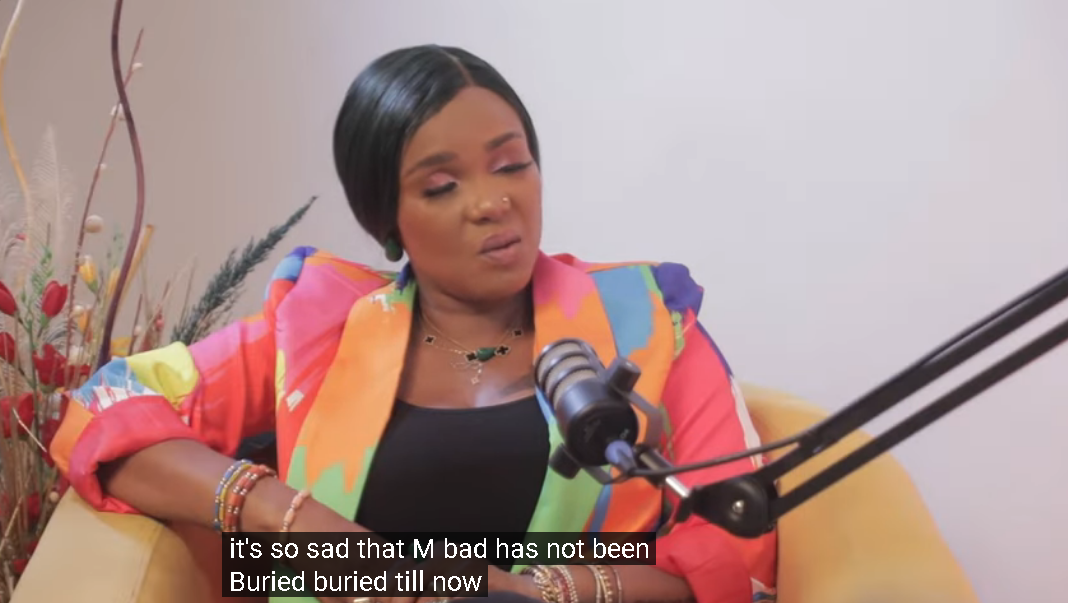Iyabo Ojo Regrets Advoc for Mohbad's Exhumation: A Turning Point in the Case?
Quote from Oladosun Joshua Segun on January 7, 2025, 12:08 PM
The tragic death of Nigerian singer Mohbad has raised numerous questions and emotions among fans and celebrities alike. Iyabo Ojo, a well-known Nollywood actress, was actively vocal about the need for justice following Mohbad’s passing. However, her recent expressions of regret for advocating the exhumation of Mohbad’s body have introduced new dimensions to this unfolding narrative.
The untimely death of Mohbad sparked immediate public outrage. Fans and the entertainment community were quick to demand an in-depth investigation and accountability. Social media was flooded with calls for justice, creating a powerful movement that had everyone speculating about the circumstances of his death.
Iyabo Ojo emerged as a prominent voice in this movement. Her passionate pleas for a thorough investigation resonated with many, making her a leading figure in the calls for action. She emphasized the need to uncover the truth, advocating for the exhumation of Mohbad’s body to seek forensic evidence.
Speaking during a recent interview on the Talk to B Podcast, Iyabo revealed that her initial intentions were driven by a desire for justice and clarity regarding the circumstances surrounding the singer’s demise. At the time, she did not realize that Mohabad's case would drag on as long as it did without concrete progress.
However, Ojo’s strong stance soon faced backlash. Critics questioned the ethics of her advocacy, arguing that such calls might interfere with due process. She has since retracted her statements, expressing regret for her earlier remarks about exhumation. This apology has raised questions about the influence of celebrities in sensitive matters.
Celebrities like Iyabo Ojo have immense sway over public opinion. Their words can spark movements or incite backlash. This power carries both responsibility and risk, particularly in high-profile cases involving tragic circumstances.
Iyabo explained, “I wouldn’t have requested that Mohbad be exhumed if I knew his case would turn out this way. I just wanted Mohbad’s body exhumed so they could do the autopsy to find out the cause of his death. I did my best to be sure that everyone was investigated, but when they came up with different theories, DNA became more important to them,"
When Ojo made her initial comments, social media erupted. Supporters rallied behind her, but dissenters also voiced their concerns. The reactions highlighted the polarized views surrounding the case and demonstrated how quickly public sentiment can change.
Misinformation spread rapidly during this time. Speculation about the reasons for Mohbad's death clouded the facts, creating a chaotic environment where truth became hard to discern. This kind of misinformation can complicate investigations and shift public focus away from the facts.
Exhumation is a serious legal step usually reserved for cases where foul play is suspected. It has been utilized in various historical cases to uncover new evidence. Learning from these precedents can shed light on similar situations.
Exhumation requires careful planning and legal oversight. Authorities must ensure proper handling to maintain the integrity of evidence. Challenges arise from emotional and ethical considerations, adding complexity to already sensitive cases.
Forensic analysis can potentially reveal crucial details about a suspicious death. This may include determining cause of death or uncovering vital clues that lead to accountability. In Mohbad’s case, such evidence could alter public perception and impact the investigation.
Media narratives around Mohbad's death have shifted over time. Initial reports mainly focused on public outrage, but they now encompass a broader scope of analysis. This shift reflects changing public sentiments and growing awareness of the complexities at play.
Polls indicate fluctuating public opinions regarding the investigation. Some remain steadfast in seeking justice, while others urge caution and patience. Social media trends provide insight into the collective mindset, illustrating the dynamic nature of public advocacy.
Ojo's regret has added a layer of complexity to her role as a public figure. The effect of her apology might inspire others to reflect on the responsibility that comes with advocacy. Her change of heart could influence how public figures engage in sensitive cases moving forward.
Celebrities have a platform that can be used to inform and advocate. However, the impact of their statements can be profound. Responsible communication involves balancing advocacy with sensitivity to ongoing investigations.
Misinformation can derail efforts for justice. Both celebrities and media outlets must commit to fact-checking to ensure accurate reporting. Balanced perspectives promote responsible discourse, steering clear of sensationalism.
Jumping to conclusions can have lasting consequences. Premature assertions may tarnish reputations and mislead the public. Caution and discretion become essential, particularly in high-stakes situations like this.
As the investigation continues, patience is vital. Allowing due process ensures justice is served without undue influence. This becomes paramount in maintaining public trust in the system.
Transparency will be key in the ongoing inquiry. As authorities work to unravel the circumstances of Mohbad's death, clear communication can help assure the public that their concerns are being addressed.
Celebrities can play a role in promoting responsible engagement. They should aim to:
- Verify information before sharing.
- Promote educational content that fosters informed discussions.
- Be mindful of the potential impact of their statements on sensitive issues.
Iyabo Ojo's experiences highlight the challenges faced by public figures in advocating for justice. As this case unfolds, the ongoing relevance of Mohbad’s story emphasizes the need for careful thought and measured advocacy. The ultimate goal remains clear justice for Mohbad and a thorough investigation that honors his memory.
Awareness and action are needed to ensure transparency and accountability, setting a precedent for future cases. The lessons learned from this incident can shape responsible discourse and community engagement moving forward.

The tragic death of Nigerian singer Mohbad has raised numerous questions and emotions among fans and celebrities alike. Iyabo Ojo, a well-known Nollywood actress, was actively vocal about the need for justice following Mohbad’s passing. However, her recent expressions of regret for advocating the exhumation of Mohbad’s body have introduced new dimensions to this unfolding narrative.
The untimely death of Mohbad sparked immediate public outrage. Fans and the entertainment community were quick to demand an in-depth investigation and accountability. Social media was flooded with calls for justice, creating a powerful movement that had everyone speculating about the circumstances of his death.

Iyabo Ojo emerged as a prominent voice in this movement. Her passionate pleas for a thorough investigation resonated with many, making her a leading figure in the calls for action. She emphasized the need to uncover the truth, advocating for the exhumation of Mohbad’s body to seek forensic evidence.
Register for Tekedia Mini-MBA edition 17 (June 9 – Sept 6, 2025) today for early bird discounts. Do annual for access to Blucera.com.
Tekedia AI in Business Masterclass opens registrations.
Join Tekedia Capital Syndicate and co-invest in great global startups.
Register to become a better CEO or Director with Tekedia CEO & Director Program.
Speaking during a recent interview on the Talk to B Podcast, Iyabo revealed that her initial intentions were driven by a desire for justice and clarity regarding the circumstances surrounding the singer’s demise. At the time, she did not realize that Mohabad's case would drag on as long as it did without concrete progress.
However, Ojo’s strong stance soon faced backlash. Critics questioned the ethics of her advocacy, arguing that such calls might interfere with due process. She has since retracted her statements, expressing regret for her earlier remarks about exhumation. This apology has raised questions about the influence of celebrities in sensitive matters.

Celebrities like Iyabo Ojo have immense sway over public opinion. Their words can spark movements or incite backlash. This power carries both responsibility and risk, particularly in high-profile cases involving tragic circumstances.
Iyabo explained, “I wouldn’t have requested that Mohbad be exhumed if I knew his case would turn out this way. I just wanted Mohbad’s body exhumed so they could do the autopsy to find out the cause of his death. I did my best to be sure that everyone was investigated, but when they came up with different theories, DNA became more important to them,"
When Ojo made her initial comments, social media erupted. Supporters rallied behind her, but dissenters also voiced their concerns. The reactions highlighted the polarized views surrounding the case and demonstrated how quickly public sentiment can change.

Misinformation spread rapidly during this time. Speculation about the reasons for Mohbad's death clouded the facts, creating a chaotic environment where truth became hard to discern. This kind of misinformation can complicate investigations and shift public focus away from the facts.
Exhumation is a serious legal step usually reserved for cases where foul play is suspected. It has been utilized in various historical cases to uncover new evidence. Learning from these precedents can shed light on similar situations.
Exhumation requires careful planning and legal oversight. Authorities must ensure proper handling to maintain the integrity of evidence. Challenges arise from emotional and ethical considerations, adding complexity to already sensitive cases.
Forensic analysis can potentially reveal crucial details about a suspicious death. This may include determining cause of death or uncovering vital clues that lead to accountability. In Mohbad’s case, such evidence could alter public perception and impact the investigation.
Media narratives around Mohbad's death have shifted over time. Initial reports mainly focused on public outrage, but they now encompass a broader scope of analysis. This shift reflects changing public sentiments and growing awareness of the complexities at play.
Polls indicate fluctuating public opinions regarding the investigation. Some remain steadfast in seeking justice, while others urge caution and patience. Social media trends provide insight into the collective mindset, illustrating the dynamic nature of public advocacy.
Ojo's regret has added a layer of complexity to her role as a public figure. The effect of her apology might inspire others to reflect on the responsibility that comes with advocacy. Her change of heart could influence how public figures engage in sensitive cases moving forward.
Celebrities have a platform that can be used to inform and advocate. However, the impact of their statements can be profound. Responsible communication involves balancing advocacy with sensitivity to ongoing investigations.
Misinformation can derail efforts for justice. Both celebrities and media outlets must commit to fact-checking to ensure accurate reporting. Balanced perspectives promote responsible discourse, steering clear of sensationalism.
Jumping to conclusions can have lasting consequences. Premature assertions may tarnish reputations and mislead the public. Caution and discretion become essential, particularly in high-stakes situations like this.
As the investigation continues, patience is vital. Allowing due process ensures justice is served without undue influence. This becomes paramount in maintaining public trust in the system.
Transparency will be key in the ongoing inquiry. As authorities work to unravel the circumstances of Mohbad's death, clear communication can help assure the public that their concerns are being addressed.
Celebrities can play a role in promoting responsible engagement. They should aim to:
- Verify information before sharing.
- Promote educational content that fosters informed discussions.
- Be mindful of the potential impact of their statements on sensitive issues.
Iyabo Ojo's experiences highlight the challenges faced by public figures in advocating for justice. As this case unfolds, the ongoing relevance of Mohbad’s story emphasizes the need for careful thought and measured advocacy. The ultimate goal remains clear justice for Mohbad and a thorough investigation that honors his memory.
Awareness and action are needed to ensure transparency and accountability, setting a precedent for future cases. The lessons learned from this incident can shape responsible discourse and community engagement moving forward.
Uploaded files:


